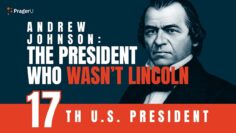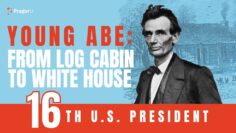
What Was the Enlightenment?
The European Enlightenment of the 18th century introduced the world to modern science, economics, medicine, and political freedom – or so we’re told. But is what we’re told accurate? Political philosopher Yoram Hazony explores this question and offers some surprising answers in this truly enlightening video.
Donate today to PragerU! http://l.prageru.com/2eB2p0h
To view the script, sources, quiz, visit https://www.prageru.com/video/what-was-the-enlightenment
Join PragerU’s text list to have these videos, free merchandise giveaways and breaking announcements sent directly to your phone! https://optin.mobiniti.com/prageru
Do you shop on Amazon? Click https://smile.amazon.com and a percentage of every Amazon purchase will be donated to PragerU. Same great products. Same low price. Shopping made meaningful.
FOLLOW us!
Facebook: https://www.facebook.com/prageru
Twitter: https://twitter.com/prageru
Instagram: https://instagram.com/prageru/
SHOP!
Love PragerU? Now you can wear PragerU merchandise! Visit our store today! https://shop.prageru.com/
JOIN PragerFORCE!
For Students: http://l.prageru.com/2aozfkP
JOIN our Educators Network! http://l.prageru.com/2aoz2y9
Script:
Modern science, medicine, political freedom, the market economy—all of them, we’re told, are the result of a sort of miracle that took place 250 years ago. That miracle is called the Enlightenment, a moment in history when philosophers suddenly overthrew religious dogma and tradition and replaced it with human reason. Harvard professor Steven Pinker puts it this way: “Progress is a gift of the ideals of the Enlightenment.”
There’s just one problem with this claim. It isn’t really true.
Consider the U.S. Constitution, which is frequently said to be a product of Enlightenment thought. But you only need to read about English common law—which Alexander Hamilton and James Madison certainly did—to see that this isn’t so. Already in the 15th-century, the English jurist John Fortescue elaborated the theory of “checks and balances,” due process, and the role of private property in securing individual freedom and economic prosperity. Similarly, the U.S. Bill of Rights has its sources in English common law of the 1600s.
Or consider modern science and medicine. Long before the Enlightenment, tradition-bound English kings sponsored path-breaking scientific institutions such as the Royal College of Physicians, founded in 1518, and the Royal Society of London, founded in 1660.
The truth is that statesmen and philosophers, especially in England and the Netherlands, articulated the principles of free government centuries before America was founded.
So why give the Enlightenment all the credit? Apparently because it doesn’t look good to admit that the best and most important parts of modernity were given to us by individuals who nearly all held conservative religious and political beliefs.
The claim that all good things come from the Enlightenment is most closely associated with the late-18th-century German philosopher, Immanuel Kant. For Kant, reason is universal, infallible, and independent of experience.
His extraordinarily dogmatic philosophy insisted that there can be only one correct answer to every question in science, morality and politics. And that to reach the one correct answer, mankind had to free itself from the chains of the past—that is, from history, tradition and experience.
But this Enlightenment view is not only wrong, it’s dangerous. Human reason, when cut loose from the constraints imposed by history, tradition and experience, produces a lot of crazy notions.
The abstract Enlightenment philosophy of Jean Jacques Rousseau is a good example. It quickly pulled down the French state, leading to the French Revolution, the Reign of Terror, and the Napoleonic Wars. Millions died as Napoleon’s armies sought to rebuild every government in Europe in light of the one correct political theory he believed was permitted by Enlightenment philosophy.
Today’s cheerleaders for the Enlightenment tend to skip this part of the story. They also pass over the fact that the father of communism, Karl Marx, saw himself as promoting universal reason as well. His new “science” of economics ended up killing tens of millions of people in the 20th century. So did the supposedly scientific race theories of the Nazis. The greatest catastrophes of modernity were engineered by individuals who claimed to be exercising reason.
In contrast, most of the progress we’ve made comes from conservative traditions openly skeptical of human reason. The Enlightenment’s critics, including John Selden, David Hume, Adam Smith, and Edmund Burke, emphasized the unreliability of “abstract reasoning” and urged us to stick close to custom, history, and experience in all things.
For the complete script, visit https://www.prageru.com/video/what-was-the-enlightenment
source











Bro forgot to say that his so called virtues of nationalism, aka nationalism, comes from the enlightenment…
After all, the birthplace of nationalism is French Revolution, which in turn was inspired from the enlightenment.
The enlightenment and its philosophers also inspired themselves from the British glorious revolution of 1688 and the English bill of rights when the Netherlands republic defeated England’s absolute monarchy and occupied it, then changed it to a constitutional monarchy, the same way they inspired themselves from the Netherlands republic, the Roman republic and the Greek Athenian democracy and its philosophers…
The enlightenment is not just about creating new ideas, it is also about remembering the good things that happened in the past which were lost for the moment known as the dark ages… the philosophers of the enlightenment most likely valued progress, but were probably more conservative than this channel will ever be (Rousseau a philosopher of the enlightenment valued the idea that women could not be true citizens of the state because they lacked civic duty and they were more into personal and familiar). Rousseau despite being a philosopher of the enlightenment where reason was prioritized, he went deeply against the traditional meaning of reason before he thought that the people were not advancing but regressing in progress, that nothing changed except illusion… we can see this in his theory of the state of nature. Only Voltaire valued reason and yet he was more moderate politically speaking, but Rousseau which was politically more radical didn’t necessarily value reason lol…
Bro does NOT know what he is talking about
Kant Was sceptical in special sense that we can never know the Nauman i.e, the thing in themselves. And this fellow has missed this central claim of Kantian Enlightenment Humility expressed in the Critique of Pure Reason .
I clicked this video to see what it definitely wasn't.
Islamic Sharia is the only just system in the world!
total conservative propaganda. should have expected this from PU.
Hey, do you remember those ideas that go along with Enlightenment ideas in the same historical period? Those AREN'T Enlightenment ideas! -Prager U
ADAM SMITH??? THE FOREFATHER OF CAPITALISM WAS ANTI-ENLIGHTENMENT??
How the hell can you talk about napoleon when u have another video praising him
As a conservative I think that you can’t deny John Lockes contributions to the constitution and bill of rights. I also think that John Locke cared about individual wisdom not group think as the so called liberals of today. I think conservatives still dislike revolutionary idealism but we do care about reason and individualism in the context of merit and a measurement of societal good over rationale based in idealism. Enlightenment is often hated by those who are traditional when it is considered an anti religious period when many enlightenment figures who opposed religions and kings were Protestant or religious. Now many “liberals” are politically inclined to support privileged classes and communist, and socialist ideas instead of individualist ideas.
Well this video was a waste of 5:32 seconds. Rubbish
If you look up "Galileo affair", you'll see it voids every argument made here.
To be anti-enlightenmnent is to be anti-american. To say the entire body of the constitution and bill of rights were just a result of English Common Law and no other influence is braindead.
Bring back the dislike button!
👏👏👏
Stupid video
Nonsense! Hahahahahahahahah
Every night I pray for every moron who takes these paid lying idiots words as gospel
I love prager u but this video sucks!
The year is 2030, and now PragerU post videos that beyond comprehension, its a compilation of gunts, moans, and other pre-linguistic noises. Occasionally a graphic of a phone or computer appears with a red x over it, and a symbol of a rock appears with a green checkmark next to it. They've gone full primitivist.
There are so many problems with this video that is hard to even start pointing them out. Do not take this video as a good description of the enlightenment. Search for other sources.
The video started out well, but the late examples were not ideal for his proposition. I would have used examples of judges who have made very rational, yet ridiculous judgements (by todays standards). Jordan Peterson's "You can't derive an ought from an us" seems to be a more solid foundation for arguing the role of Judeao-Christian ethics.
Why would any responsible American want to make this kind of didactic waste matter to America?
Many of us are thinking of ingenuous ways to improve our educational system, but these antiquated Prager University (Trump University) miscreant professors, desperately want to take us back to an educational zeitgeist that predates Nicolaus Copernicus.
Can't believe these anti educational varmints collect a salary for these offerings.
Thanks.
America was founded on the enlightenment. If you hate the Enlightenment then you hate America PragerU😂
This is absolutely ridiculous
OK First Edmund Burke was actually against the American revolution so if everybody had followed him we wouldn't have the freedoms we have now also I recommend everyone here read Thomas Paines the age of reason you see the enlightenment saw that the traditional Monarchy was just a way to control people during that time people had been manipulated into thinking that science was wrong and that they had worship the way the church wanted them to worship. By the way if it weren't for Thomas Paines beliefs we wouldn't have America I hope you all learned something.
Tradition is peer pressure from dead people. It's a terrible basis to decide on a course of action.
So I wanted knowledge and instead all you give is opinion. This channel is ridiculous.
God was part of English enlightenment also Scottish. Not French in its majority, and more or less the German. Well, Spain and Italy was ultimately fully dominated by the Catholic Church, and this institution was very rigid with free thought. We owe a lot to Henry the Viii